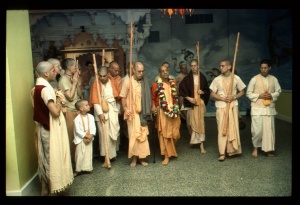SB 9.24.10-11: Difference between revisions
(Vanibot #0018 edit: make synonym terms in Sanskrit italic in SB - Vanisource) |
(Vanibot #0054 edit - transform synonyms into clickable links, which search similar occurrences) |
||
| Line 28: | Line 28: | ||
<div class="synonyms"> | <div class="synonyms"> | ||
''babhruḥ'' | ''[//vanipedia.org/wiki/Special:VaniSearch?s=babhruḥ&tab=syno_o&ds=1 babhruḥ]'' — King Babhru; ''[//vanipedia.org/wiki/Special:VaniSearch?s=śreṣṭhaḥ&tab=syno_o&ds=1 śreṣṭhaḥ]'' — the best of all kings; ''[//vanipedia.org/wiki/Special:VaniSearch?s=manuṣyāṇām&tab=syno_o&ds=1 manuṣyāṇām]'' — of all human beings; ''[//vanipedia.org/wiki/Special:VaniSearch?s=devaiḥ&tab=syno_o&ds=1 devaiḥ]'' — with the demigods; ''[//vanipedia.org/wiki/Special:VaniSearch?s=devāvṛdhaḥ&tab=syno_o&ds=1 devāvṛdhaḥ]'' — King Devāvṛdha; ''[//vanipedia.org/wiki/Special:VaniSearch?s=samaḥ&tab=syno_o&ds=1 samaḥ]'' — equally situated; ''[//vanipedia.org/wiki/Special:VaniSearch?s=puruṣāḥ&tab=syno_o&ds=1 puruṣāḥ]'' — persons; ''[//vanipedia.org/wiki/Special:VaniSearch?s=pañca&tab=syno_o&ds=1 pañca]-[//vanipedia.org/wiki/Special:VaniSearch?s=ṣaṣṭiḥ&tab=syno_o&ds=1 ṣaṣṭiḥ]'' — sixty-five; ''[//vanipedia.org/wiki/Special:VaniSearch?s=ca&tab=syno_o&ds=1 ca]'' — also; ''[//vanipedia.org/wiki/Special:VaniSearch?s=ṣaṭ&tab=syno_o&ds=1 ṣaṭ]-[//vanipedia.org/wiki/Special:VaniSearch?s=sahasrāṇi&tab=syno_o&ds=1 sahasrāṇi]'' — six thousand; ''[//vanipedia.org/wiki/Special:VaniSearch?s=ca&tab=syno_o&ds=1 ca]'' — also; ''[//vanipedia.org/wiki/Special:VaniSearch?s=aṣṭa&tab=syno_o&ds=1 aṣṭa]'' — eight thousand; ''[//vanipedia.org/wiki/Special:VaniSearch?s=ca&tab=syno_o&ds=1 ca]'' — also; ''[//vanipedia.org/wiki/Special:VaniSearch?s=ye&tab=syno_o&ds=1 ye]'' — all of them who; ''[//vanipedia.org/wiki/Special:VaniSearch?s=amṛtatvam&tab=syno_o&ds=1 amṛtatvam]'' — liberation from material bondage; ''[//vanipedia.org/wiki/Special:VaniSearch?s=anuprāptāḥ&tab=syno_o&ds=1 anuprāptāḥ]'' — achieved; ''[//vanipedia.org/wiki/Special:VaniSearch?s=babhroḥ&tab=syno_o&ds=1 babhroḥ]'' — because of association with Babhru; ''[//vanipedia.org/wiki/Special:VaniSearch?s=devāvṛdhāt&tab=syno_o&ds=1 devāvṛdhāt]'' — and because of association with Devāvṛdha; ''[//vanipedia.org/wiki/Special:VaniSearch?s=api&tab=syno_o&ds=1 api]'' — indeed; ''[//vanipedia.org/wiki/Special:VaniSearch?s=mahābhojaḥ&tab=syno_o&ds=1 mahābhojaḥ]'' — King Mahābhoja; ''[//vanipedia.org/wiki/Special:VaniSearch?s=ati&tab=syno_o&ds=1 ati]-[//vanipedia.org/wiki/Special:VaniSearch?s=dharma&tab=syno_o&ds=1 dharma]-[//vanipedia.org/wiki/Special:VaniSearch?s=ātmā&tab=syno_o&ds=1 ātmā]'' — exceedingly religious; ''[//vanipedia.org/wiki/Special:VaniSearch?s=bhojāḥ&tab=syno_o&ds=1 bhojāḥ]'' — the kings known as Bhoja; ''[//vanipedia.org/wiki/Special:VaniSearch?s=āsan&tab=syno_o&ds=1 āsan]'' — existed; ''[//vanipedia.org/wiki/Special:VaniSearch?s=tat&tab=syno_o&ds=1 tat]-[//vanipedia.org/wiki/Special:VaniSearch?s=anvaye&tab=syno_o&ds=1 anvaye]'' — in the dynasty of him (Mahābhoja). | ||
</div> | </div> | ||
Latest revision as of 23:55, 18 February 2024

A.C. Bhaktivedanta Swami Prabhupada
TEXTS 10-11
- babhruḥ śreṣṭho manuṣyāṇāṁ
- devair devāvṛdhaḥ samaḥ
- puruṣāḥ pañca-ṣaṣṭiś ca
- ṣaṭ-sahasrāṇi cāṣṭa ca
- ye 'mṛtatvam anuprāptā
- babhror devāvṛdhād api
- mahābhojo 'tidharmātmā
- bhojā āsaṁs tad-anvaye
SYNONYMS
babhruḥ — King Babhru; śreṣṭhaḥ — the best of all kings; manuṣyāṇām — of all human beings; devaiḥ — with the demigods; devāvṛdhaḥ — King Devāvṛdha; samaḥ — equally situated; puruṣāḥ — persons; pañca-ṣaṣṭiḥ — sixty-five; ca — also; ṣaṭ-sahasrāṇi — six thousand; ca — also; aṣṭa — eight thousand; ca — also; ye — all of them who; amṛtatvam — liberation from material bondage; anuprāptāḥ — achieved; babhroḥ — because of association with Babhru; devāvṛdhāt — and because of association with Devāvṛdha; api — indeed; mahābhojaḥ — King Mahābhoja; ati-dharma-ātmā — exceedingly religious; bhojāḥ — the kings known as Bhoja; āsan — existed; tat-anvaye — in the dynasty of him (Mahābhoja).
TRANSLATION
"It has been decided that among human beings Babhru is the best and that Devāvṛdha is equal to the demigods. Because of the association of Babhru and Devāvṛdha, all of their descendants, numbering 14,065, achieved liberation." In the dynasty of King Mahābhoja, who was exceedingly religious, there appeared the Bhoja kings.